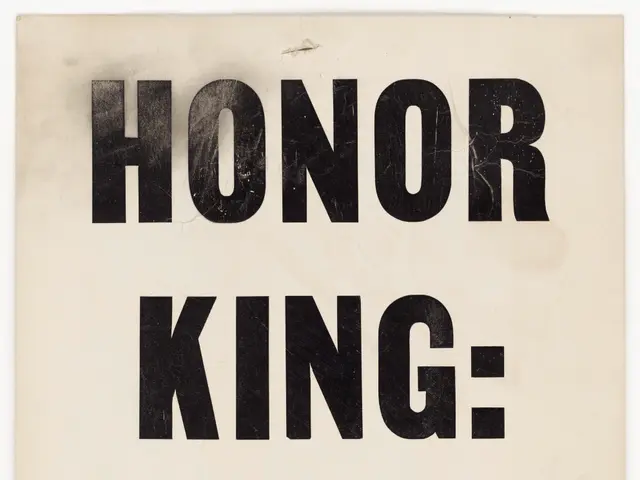Online platform for medication information, KnowUrMedicine, created by a Mumbai teen, caters to individuals who struggle with reading, detailing its functionality.
In a commendable initiative, 17-year-old Som Sengupta from Mumbai has developed KnowUrMedicine, a web application designed to provide critical medicine information in accessible and understandable formats for India's vernacular-speaking and less literate populations.
The app leverages Optical Character Recognition (OCR) technology to extract text from medicine labels uploaded by users, primarily medicine packaging photos. This text extraction enables the app to detect important medicine information such as dosage instructions and side effects.
Next, an AI model, likely accessed via API, processes and translates this extracted information into vernacular languages like Hindi and Marathi, catering to non-English speakers. Finally, Text-to-Speech (TTS) technology converts the translated text into audio, allowing the medicine information to be played aloud for users who may be less literate or unable to read the text themselves.
The user accesses the app via a QR code or link, chooses a language, uploads a photo, and receives spoken medicine instructions, making medicine information accessible to India's less literate population in their native languages.
Som opted for an off-the-shelf AI translator to keep development lean and ensure accurate translations of technical terms. However, early mistranslations were a challenge, but refining the AI prompts improved precision. Similarly, Som faced a learning curve in mastering FastAPI and AI integration during development.
To enhance accessibility, KnowUrMedicine's interface is simple and mobile-optimized, requiring minimal user input—scan QR code, select language, upload photo—and performing all processing in the cloud without storing user data, enhancing privacy and scalability. The app's cloud-based architecture and QR code model facilitate efficient handling of growing user loads and easy access.
The app's success is evident in its field tests with over 200 customers, where iterative testing and refinement honed the system's accuracy. A study shows 45% of patients misinterpret dosage or frequency without native-language instructions, posing health risks. With KnowUrMedicine, this risk is significantly reduced.
Moreover, 85% of Indians lack English proficiency, and 90% of medicine labels are in English, leading to medication errors for many. KnowUrMedicine aims to bridge this gap by providing medicine information in vernacular languages, ensuring accuracy and accessibility.
Som collaborated with 20+ healthcare professionals and 3-4 chemists for real-world feedback, ensuring the app met practical needs. The app's TTS module, initially sounding robotic, was improved to achieve a conversational tone for users with low literacy. Furthermore, an audio autoplay feature was implemented to eliminate the need for users to press a button for audio playback.
Som's goal is to make the app widely available, envisioning it on medicine bags or at chemist shops. With its innovative use of AI, OCR, and TTS, KnowUrMedicine is poised to revolutionize the way medicine information is accessed and understood in India.
- Som's initiative, KnowUrMedicine, targets India's vernacular-speaking and less literate population, providing critical medicine information.
- OCR technology within KnowUrMedicine extracts text from medicine labels, allowing it to detect important details like dosage instructions and side effects.
- An AI model within the app processes and translates the extracted information into vernacular languages, catering to non-English speakers.
- TTS technology converts the translated text into audio, making the information accessible for users who may be illiterate or unable to read.
- Users access the app via a QR code or link, choose a language, upload a photo, and receive spoken medicine instructions.
- KnowUrMedicine uses an off-the-shelf AI translator to ensure accurate translations of technical terms, but early mistranslations were a challenge.
- The app's cloud-based architecture and QR code model facilitate efficient handling of growing user loads and easy access.
- Field tests with over 200 customers showed that KnowUrMedicine's accuracy was significantly improved through iterative testing and refinement.
- A study revealed that 45% of patients misinterpret dosage or frequency without native-language instructions, posing health risks.
- 85% of Indians lack English proficiency, and 90% of medicine labels are in English, leading to medication errors for many.
- KnowUrMedicine aims to bridge this gap by providing medicine information in vernacular languages, ensuring accuracy and accessibility.
- Collaborations with healthcare professionals and chemists provided real-world feedback to ensure the app met practical needs.
- The TTS module was improved to achieve a conversational tone for users with low literacy.
- An audio autoplay feature was implemented to eliminate the need for users to press a button for audio playback.
- Som envisions the app being widely available, possibly on medicine bags or at chemist shops.
- The innovative use of AI, OCR, and TTS is set to revolutionize the way medicine information is accessed and understood in India.
- This technology can potentially benefit other health-related areas, such as eye-health, hearing, or digestive-health.
- In the realm of workplace-wellness, KnowUrMedicine could help manage chronic-diseases like chronic-kidney-disease, type-2-diabetes, cancer, neurological-disorders, or autoimmune-disorders.
- With advancements in technology, KnowUrMedicine may incorporate education-and-self-development materials, promoting personal-growth, mindfulness, and career-development, thereby contributing to lifelong-learning and skills-training.





